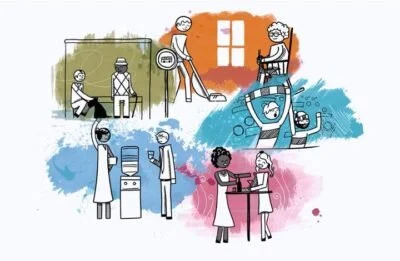6 Steps To Improve Your Well-Being
I've just been reflecting on my week so far; my personal life - how that's felt tiring, and the themes within work which seem to be about loss in some way shape or form recently. I thought I'd write this blog as it's something people on my social media pages show a lot of interest in.
Whereas self care is always floating around in my head for myself, I've been doing a lot of exploration with clients too - about how they can take active steps to improving their own well-being.
The exploration element is aimed at giving them something to walk away with and do, but this also tends to turn into deep therapeutic content around their difficulties to make the positive steps; difficulties such as core beliefs that blanket their experience of life, such as life is hard (I'm too busy, there's nothing in my area, I have no child-care) or people are fake and not trust-worthy (I don't share stuff about me because it just gets spread around). It's these beliefs which can unconsciously be reinforced by our negative patterns in life.
That being said - I thought I'd write this blog to explore with you, what well-being is in my opinion, and ways which I think you will find useful if you want to improve your own.
I recently watched a video my an American man (Richard Davidson) who founded a center dedicated to studying the healthy qualities of the mind - he said 60% of our well-being is based on genetics, circumstances and up-bring; which means we have a whopping 40% to play with and be responsible for. Another piece of research presented the 'Ladder of Life' where people were asked to rate their life on the ladder; the bottom of the ladder (0) being at the bottom and the top of the ladder (10) the best possible imagined life i.e. where you want to be - it was considered that if you give a 7+ then you are thriving. Shockingly - only 24% of the worlds population were considered to be thriving.
Here are 6 areas that are commonly considered as being indicative of our well-being:
Body - our physiology is important to our esteem and well-being. Creating opportunities to increase the heart rate promotes sleep, energy levels and reduces the symptoms of depression due to the release of endorphins. Quality sleep, good nutrition and fluid intake all fall within this important area.
Mind - keeping our mind active such as learning a new skill has been positively linked to well-being
Community - people tend to feel better when they are contributing to society - it gives a sense of belonging and purpose
People - connections with friends and family, or joining clubs reduces the amount of time spent on our own and the likelihood that our thoughts and feelings with stagnate
Awareness - opening our eyes to the bigger picture of life - switching our energy from those things that often consume us and noticing something else - this can be outside in the environment or activities that require in-depth concentration
Pride - whether it's caring for the environment by recycling or showing care for your life in other places - developing a sense of pride promotes self esteem and well-being
It's also useful to consider what you're already doing that works against your efforts of improving your well-being; whilst this list suggests things that you can add to your life, are there any things that would be a good idea to cut out?

